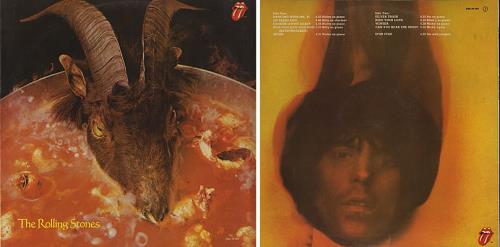
The influence of Astral Weeks is particularly apparent on this track, especially when the strings swoop in. “I’ve been burning my bell, book and candle, and the restoration plays have all gone around,” is a great line, whatever it means. ‘Winter’ is wonderfully evocative of a dirty, freezing London and Withnail-esque hippies huddling in their greatcoats after they’ve put their last sixpence in the gas meter, and dreaming of the California sun.

‘Silver Train’ is a rolling blues driven by Ian Stewart’s piano and a combination of harmonica and slide guitar, that’s all about travelling across some state line to have sex with a prostitute: “I did not know her name, but she laughed and took my money.” Mick plays piano himself on the equally bluesy ‘Hide your Love,’ which also features a great guitar solo and a powerful, rock-gospel conclusion that Primal Scream have ripped off more than once. “All those dreams we had, they all went up in smoke… where do we go from here?” But still, “they can’t say we never tried.”

Indeed, the sense of regret and hopelessness in the classic ‘Angie,’ which follows- ostensibly about the end of a love affair- could as well be about the failure of the idealistic 1960s and the dawning of a new, harsher decade. But the song’s anger is ultimately impotent and frustrated, offering no hope of restitution, of justice being done or the world ever becoming a better place. It’s a powerful, city-smooth rocker, driven by a blaring brass section, which has a similar feel to Dylan’s later ‘Hurricane’ in its rage at the shooting of an innocent black kid by New York cops.
THE ROLLING STONES GOATS HEAD SOUP FREE
‘Doo Doo Doo Doo Doo (Heartbreaker)’ struggles free of the world-weary torpor however, animated by genuine anger at the injustices of the world and the corruption and unfairness of society. “Where are all my friends? The sky fell down again,” Keith sings plaintively, like Johnny Thunders never quite could. ‘Coming down Again’ is a sorrowful piano-led ballad, with wah-d guitars chiming like distant bells. The Van Morrison-esque ‘100 Years Ago’ is one of the great forgotten Rolling Stones numbers, a song of regret and loss with the hookline, “sometimes don’t you think it’s wise not to grow up.” The laid-back funk of Billy Preston’s clavinet playing gives way to a strident wah-wah guitar solo and a brilliant, double-time, heart-quickening jam session coda. Guitars and piano intertwine like tendrils of vine around an ancient tomb. I’m reminded of Jack Kerouac’s Oedipal obsession with the “meat wheel” of birth, desire, sex, procreation and death, a hang-up that saw casual sex become something that just brought him closer, mentally and physically, to the grave. You don’t need to be a Freudian psychologist to guess that Mick’s got some issues to deal with here, to do with growing older, facing his mortality and the fate of all flesh. Later he hooks up with a beautiful woman, “wearing boxing gloves and a black top hat,” only for the flesh to fall from her bones and for her too to be transformed into the Grim Reaper. It opens with the sinister, loping groove of ‘Dancing with Mr D,’ in which Mick meets Death in the graveyard and asks him in what manner he’ll meet his eventual end. But viewed objectively there’s not a bad song on it, and some great ensemble playing when the band- augmented by session players including Billy Preston and Nicky Hopkins on keyboards- get stuck into a groove. Maybe the hostility towards it was partly because nobody at the time wanted to be told that the party was over, least of all by the Rolling Stones. In fact it’s their most under-rated album a classic record with a completely different feel to its admittedly hard-to-follow predecessor.Ī melancholy, autumnal LP with echoes of Van Morrison’s Astral Weeks, Goat’s Head Soup is a hungover comedown record for the end of the 1960s party, blinking in the cold grey light of the 1970s. Conventional wisdom has it that Goat’s Head Soup was a disappointment after the Stones’ supposed career-best triumph of Exile on Main Street, and the start of their 1970s decline.


 0 kommentar(er)
0 kommentar(er)
